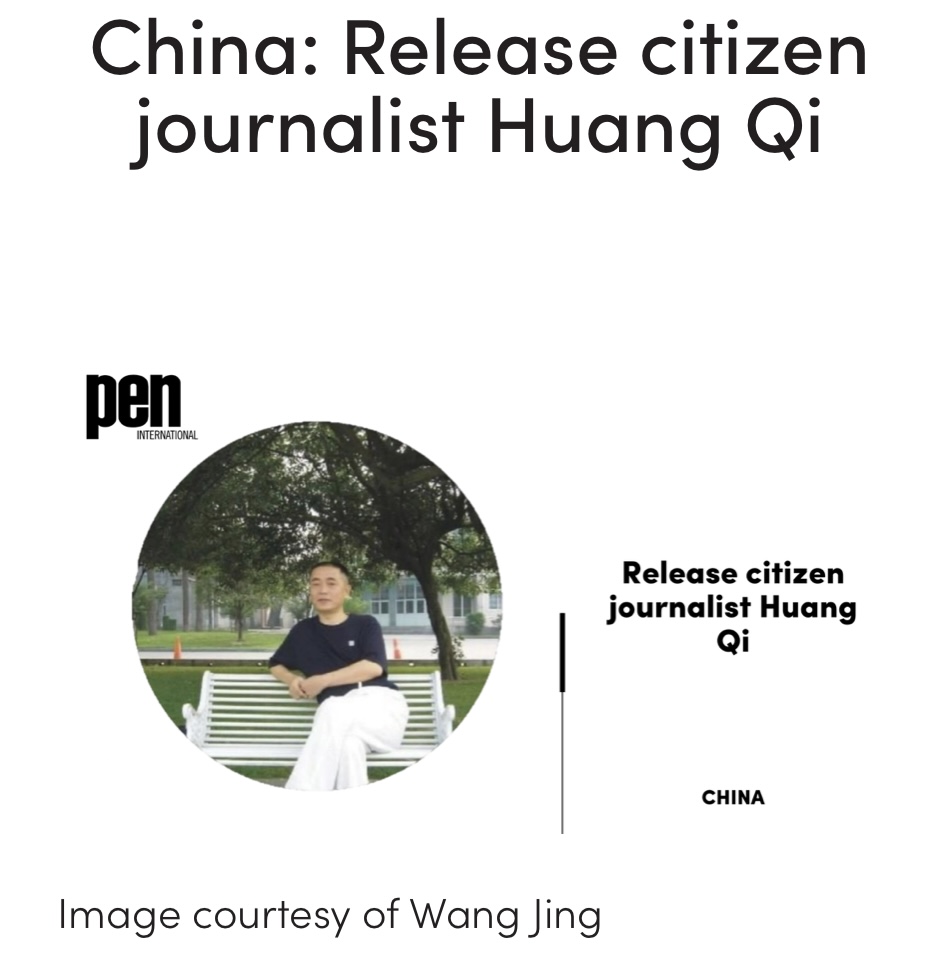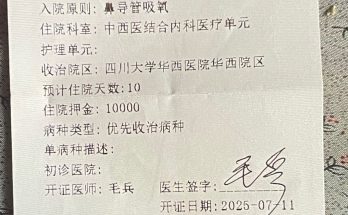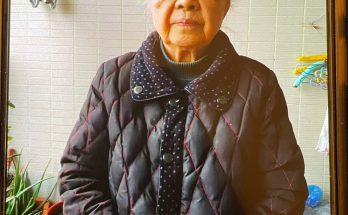【天网美西时间2023年8月3日转载】(原版英文转自国际笔会《PEN》,谷歌翻译器译)

02 August 2023: Last weekend marked four years since citizen journalist, publisher and activist Huang Qi (黄琦) was sentenced to 12 years’ imprisonment for peacefully exercising his right to freedom of expression. Huang suffers from several critical health conditions and the authorities have repeatedly denied requests from his family and legal representatives to meet with him in-person since he was imprisoned. We are deeply concerned for his health and well-being and call for his immediate and unconditional release.
On 29 July 2019, Huang Qi was sentenced to 12 years’ imprisonment and a further four years deprivation of his political rights after he was convicted of ‘leaking state secrets’ and ‘illegally providing state secrets to foreign countries’. While the trial was held behind closed doors, the conviction is thought to be connected to his work publishing reporting on human rights violations in China through his human rights website called 64 Tianwang, named after the Tiananmen Square massacre that took place on 4 June 1989.
‘At a time when independent media is heavily repressed in China, citizen journalists have played a crucial role in providing a source of uncensored news and information, often at great personal risk. Huang Qi’s unjust imprisonment on national security grounds is an alarming example of the PRC government’s intolerance towards the right to freedom of expression when it is exercised by those who speak truth to power. We call for Huang’s immediate and unconditional release’, said Ma Thida, Chair of PEN International’s Writers in Prison Committee.
On 28 November 2016, Huang was detained at his home by police just weeks after his website, 64 Tianwang, received a press freedom prize from RSF. He was then allegedly held incommunicado until his formal arrest on charges of ‘illegally providing state secrets to foreign entities’ on 16 December 2016.
While held in pre-trial detention, Huang was repeatedly denied adequate medical care, and he reported to his lawyer that the authorities deliberately provided incorrect results for his blood pressure as part of efforts to cover up the severity of his deteriorating health. Denial of adequate medical care has been a frequently used tactic against dissidents in China, including Nobel laureate and former president of the Independent Chinese PEN Centre, Liu Xiaobo.
Despite a campaign by Huang’s mother Pu Wenqing, human rights NGOs, and calls for his immediate release from United Nations experts, he remains detained while suffering from heart disease, a potentially fatal kidney condition and hydrocephalus (excess fluid in the brain).
On 24 November 2022, Pu Wengqing, who suffers from lung cancer and frequent harassment from the authorities, was permitted to see her son for the first time since he was detained through a video call lasting just two minutes before it was cut off. Since then, Pu and Huang’s lawyers have been repeatedly denied the ability to visit him and assess his wellbeing.
Huang Qi is an award-winning citizen journalist, publisher and activist who has been referred to as China’s first “cyber-dissident”. He founded China’s first human rights website, 64 Tianwang, in 1999. Reliant on a network of citizen journalists across the country, at its height, 64 Tianwang played a key role in highlighting human rights issues ranging from human trafficking to the persecution of Falun Gong practitioners.
Huang was initially praised by state media for his human rights work, however over the following years, Huang and numerous contributors to 64 Tianwang have been heavily persecuted for their reporting on sensitive human rights issues inside China.
In June 2000, eleven years after the 1989 Tiananmen Square massacre, Huang was detained after he posted articles written by others that called for the prosecution of officials responsible for the violent crackdown against student protestors on 4 June 1989. In August 2001, Huang was put on trial for “internet crimes”, reportedly the first such trial to take place in China, and sentenced to five years’ imprisonment for “inciting subversion of state power” on 9 May 2003, almost three years after he was initially detained.
According to a communication by the United Nations Working Group on Arbitrary Detention, during his detention Huang was beaten and denied medical care, resulting in injuries to his face and body, including a broken tooth. In its response to the communication, China categorically denied that Huang had suffered ill-treatment or torture while detained and even claimed that he had deliberately injured himself with a pen to avoid interrogation.
Undeterred by his imprisonment, following his release in June 2005, Huang continued to use his website to highlight politically sensitive issues, including his investigation into the government’s response to the 2008 Sichuan earthquake, where over 5,000 children and students died following the collapse of shoddily constructed public school buildings. In June 2008, Huang was detained after he visited the families of children who died in the earthquake and was sentenced the following year to three years’ imprisonment for ‘illegal possession of state secrets’. While imprisoned, Huang’s health declined significantly and he was reportedly diagnosed with a chronic kidney disease, a potentially fatal medical condition that requires regular medical treatment.
Following his release in 2011, Huang continued to publish reporting on human rights issues despite being subjected to routine harassment from the authorities, including his most recent arrest in November 2016.
For further information please contact Ross Holder, Head of the Asia/ Pacific Region at PEN International, email: ross.holder@pen-international.org
Statement·China
中文译文:
(转)中国:释放公民记者黄琪
【天网美西时间2023年8月3日转载】(转自国际笔会《PEN》)
2023 年 8 月 2 日:上周末是公民记者、出版商和活动人士黄琦因和平行使言论自由权被判处 12 年徒刑四周年。黄患有多种严重的健康问题,自他入狱以来,当局一再拒绝他的家人和法律代表亲自会见他的要求。我们深切关注他的健康和福祉,并呼吁立即无条件释放他。
2019年7月29日,黄琦因“泄露国家秘密”、“非法向境外提供国家秘密”罪被判处有期徒刑12年,剥夺政治权利4年。虽然审判是秘密进行的,但定罪被认为与他通过其名为“64天网”的人权网站发表有关中国侵犯人权行为的报道有关,该网站以1989年6月4日发生的天安门广场大屠杀命名。
“在独立媒体在中国受到严重打压的时候,公民记者在提供未经审查的新闻和信息来源方面发挥了至关重要的作用,而他们往往冒着巨大的个人风险。黄琦以国家安全为由被不公正监禁,这是中国政府不容忍那些对权力讲真话的人行使言论自由权的令人震惊的例子。国际笔会狱中作家委员会主席马蒂达表示,我们呼吁立即无条件释放黄。
2016 年 11 月 28 日,黄在其网站“64 天网”获得无国界记者组织新闻自由奖几周后被警方拘留在家中。据称,他随后被单独监禁,直到 2016 年 12 月 16 日以“非法向外国实体提供国家机密”罪名被正式逮捕。
在审前拘留期间,黄一再被拒绝提供足够的医疗护理,他向律师报告说,当局故意提供不正确的血压结果,以掩盖他健康状况恶化的严重性。拒绝提供足够的医疗服务一直是中国针对异见人士的常用策略,其中包括诺贝尔奖获得者、独立中文笔会前主席刘晓波。
尽管黄的母亲蒲文清和人权非政府组织发起了运动,并呼吁联合国专家立即释放他,但他仍然被拘留,同时患有心脏病、可能致命的肾脏疾病和脑积水。
2022年11月24日,身患肺癌、经常受到当局骚扰的濮文清通过视频通话,在儿子被拘留后首次获准会见儿子,视频通话仅持续了两分钟就被切断。此后,浦和黄的律师多次被拒绝探视他并评估他的健康状况。
黄奇是一位屡获殊荣的公民记者、出版商和活动家,被称为中国第一位“网络异见人士”。他于1999年创立了中国第一个人权网站“64天网”。64天网在鼎盛时期依靠遍布全国的公民记者网络,在关注从人口贩运到迫害法轮功等人权问题方面发挥了关键作用。从业者。
黄最初因其人权工作而受到官方媒体的赞扬,但在接下来的几年里,黄和64天网的众多撰稿人因报道中国境内敏感的人权问题而受到严重迫害。
2000 年 6 月,即 1989 年天安门广场大屠杀 11 年后,黄因发表其他人撰写的文章,呼吁起诉对 1989 年 6 月 4 日暴力镇压学生抗议者负有责任的官员而被拘留。2001 年 8 月,黄被拘留2003 年 5 月 9 日,他因“网络犯罪”接受审判,据报道这是中国首次进行此类审判,并以“煽动颠覆国家政权罪”判处五年有期徒刑,此时距他最初被拘留已近三年。
根据联合国任意拘留问题工作组的一份来函,黄在被拘留期间遭到殴打,且得不到医疗护理,导致他的面部和身体受伤,包括一颗牙齿折断。中方在对来文的回应中断然否认黄在被拘留期间遭受虐待或酷刑,甚至声称他为了逃避审讯而故意用笔伤害自己。
2005 年 6 月获释后,黄并没有被监禁吓倒,他继续利用自己的网站突出政治敏感问题,包括对政府对 2008 年四川地震的反应进行调查,当时,劣质建筑倒塌,造成 5,000 多名儿童和学生死亡。公立学校建筑。 2008年6月,黄在探望地震遇难儿童家属后被拘留,次年以“非法持有国家秘密罪”被判处三年有期徒刑。在入狱期间,黄的健康状况显着恶化,据报道他被诊断患有慢性肾病,这是一种可能致命的疾病,需要定期治疗。
2011 年获释后,黄继续发表有关人权问题的报道,尽管经常受到当局的骚扰,包括最近一次于 2016 年 11 月被捕。
如需了解更多信息,请联系国际笔会亚太区负责人 Ross Holder,电子邮件:ross.holder@pen-international.org
声明·中国


